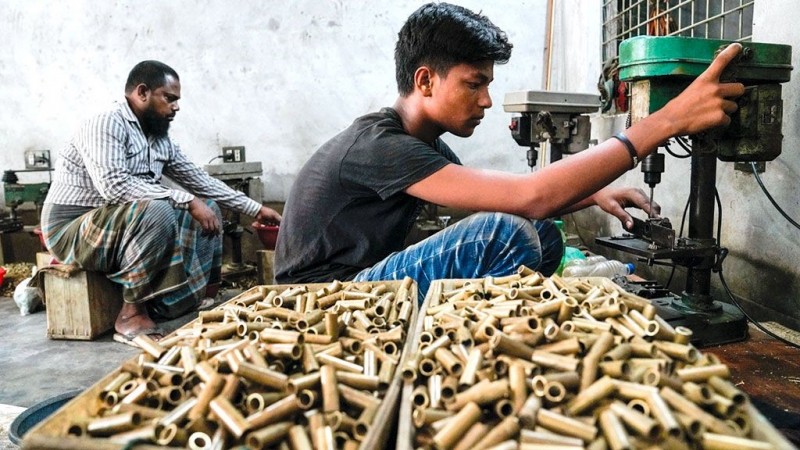
Image credit: Asian Development Bank
In Bangladesh, around 83% of the economic enterprises are cottage and micro in nature, and as of June 2020, SMEs contributed to around 27% of the GDP, says a report
Small and medium enterprises (SMEs) require proper classification in order to secure the right type of financing, experts said on Sunday based on a recently published report titled Financing SMEs: Lessons from German Experiences.
They recommended that SMEs be classified into micro and small enterprises, medium and large enterprises, innovative SMEs, normal SMEs, necessity SMEs, start-up SMEs, and mature SMEs.
MA Baqui Khalily, professor of the University of Asia Pacific and a former professor of Finance at Dhaka University, launched the report on Sunday in association with the SME Foundation and FES Bangladesh.
According to the report, MSMEs constitute over 90% of all firms and business enterprises in the world, and contribute to more than 60% of total employment.
In Bangladesh, around 83% of the economic enterprises are cottage and micro in nature and as of June 2020, SMEs contributed to around 27% of the GDP, said the report.
One the other hand, in Germany, 99% of all enterprises are MSMEs, which account for 63% of all employment, and contribute to over 54% of value addition, the report said.
However, in Germany, the government has different credit-equity support programs for financing start-up and growth enterprises, which are implemented through various institutions.
The government ensures credit-based financing for start-ups and new enterprises and innovation financing to promote digital transformation of SMEs.
Moreover, there are also high-tech start-up funds for new, highly innovative, and technology-oriented enterprises.
Hence, there is equity support for small companies and business starters, and venture tech growth financing for innovative fast-growing tech companies, said the report.
Moreover, since 1950, Germany has institutionalized credit guarantee schemes, often known as Credit Guarantee Banks, where banks have been developed as a society with a general body and executive board.
A guarantee covers up to 80% of the loan, the report added.
There are also some underlying principles of SMEs in Germany which include think small first, entrepreneurship, second chance for honest and bankrupt SMEs, and a responsive administration.
The report also identified some common constraints for Bangladeshi SMEs; most of them included limited access to bank finance, high interest rates, and collateral requirements.
Others include limited availability of skilled manpower, reluctance to use apprentices, non-linkage with technical education, lack of effective networks, lack of coordination among different agencies of the government, and negligible presence of sub-contracting for backward and forward linkages.
Regarding the report, Professor Mafizur Rahman, managing director of the SME Foundation, said that if a business fails in Germany, it is a positive thing to support it again.
“Moreover, their administration is also very responsive. The credit guarantee scheme is also very effective. It will be very good if we could initiate all of these in Bangladesh properly,” he added.
He also said that the SMEs of the country usually suffer financing-related problems, if this could happen, it would be a great solution for financial issues.
Felix Kolbitz, country representative of FES Bangladesh, said that their Ministry of Economy is going to be renamed as Ministry of Economy and Climate Change.
“The focus will be on ensuring economic development in a climate resilient way. Moreover, achieving the goal of 1.5-degree carbon emissions, Germany has taken the initiatives to strengthen SMEs,” he added.
He also said that in this current situation, every SME and other large company needs to plan how to stay carbon neutral and how to contribute to climate protection.
Therefore, in the case of financing, the role of each enterprise in protecting the climate should also be examined, he added.
Afroza Khan, managing director of Joyeeta Foundation, said it is important to ensure that 15% of women were guaranteed loans from the stimulus packages for SMEs.
“Moreover, an entrepreneur has a one-time loan policy. But for many successful and good entrepreneurs, whose records are good and pay instalments regularly, it should be given more than once,” she added.
Sheikh Md Salimullah, secretary of FID, Ministry of Finance, said that SMEs are playing a pivotal role in achieving national goals like LDC graduation by 2024, achieving SDGs by 2030, and to become a developed country by 2041.
“Under the present government, the SMEs are treated as the driving force of the economy, nearly 90% of the enterprises are SMEs in Bangladesh, generating 84% of rural non-farm employment,” he added.
The government of Bangladesh has given special emphasis on SMEs in the 8th Five Year Plan, Industrial Policy 2016, SME Finance Policy of Bangladesh Bank, and SME Policy of 2019, he added.
“Financing is a powerful intervention for economic growth, especially in a resource -constrained developing country like Bangladesh. Access to finance for rural SMEs is essential for promoting inclusive economic growth and eradicating poverty,” he also said.
“Banking system for SME financing is very important. SMEs should come up with concepts. From my position, I will try my best for the betterment of the SME entrepreneurs,” he added.
Source: https://www.dhakatribune.com/business/2021/11/29/classification-of-smes-needed-for-proper-financing-say-experts

